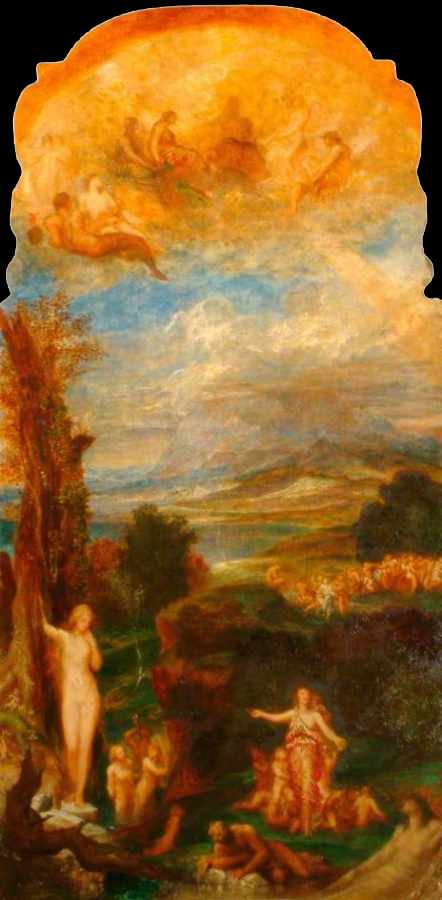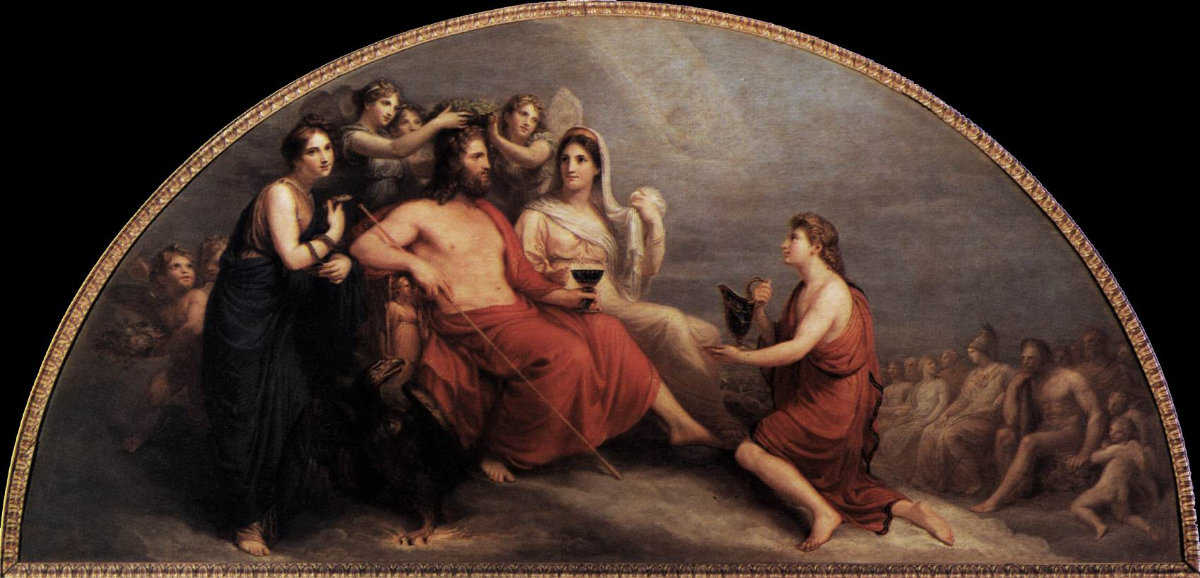In ancient Greek religion and mythology, the twelve Olympians are the major deities of the Greek pantheon, commonly considered to be Zeus, Poseidon, Hera, Demeter, Aphrodite, Athena, Artemis, Apollo, Ares, Hephaestus, Hermes, and either Hestia or Dionysus. They were called Olympians because, according to tradition, they resided on Mount Olympus. Although Hades was a major ancient Greek god and was the brother of the first generation of Olympians (Zeus, Poseidon, Hera, Demeter, and Hestia), his realm was the underworld, far from Olympus, and thus he was not usually considered to be one of the Olympians. Besides the twelve Olympians, there were many other cultic groupings of twelve gods. A fragment of a Hellenistic relief (1st century BC–1st century AD) now at the Walters Art Museum depicts the twelve Olympians carrying their attributes in procession… Hestia (scepter), Hermes (winged cap and staff), Aphrodite (veiled), Ares (helmet and spear), Demeter (scepter and wheat sheaf), Hephaestus (staff), Hera (scepter), Poseidon (trident), Athena (owl and helmet), Zeus (thunderbolt and staff), Artemis (bow and quiver) and Apollo (lyre).
| Alias Twelve Olympians, Dii Consentes |
| Real Names/Alt Names Zeus, Hera, Poseidon, Demeter, Ares, Hermes, Hephaestus, Aphrodite, Athena, Apollo, Artemis, Hestia |
| Characteristics Hero, Myths & Legends, Deity, Number-themed, Immortal, Prehuman Epoch, Greek, Italian |
| Creators/Key Contributors Unknown |
| First Appearance Greek mythology |
| First Publisher ○ |
| Appearance List Literature: Homer’s Odyssey (c. 8th century BCE, English 1614), Homer’s Iliad (c. 8th century BC), Virgil’s Aeneid (29 to 19 BC), plays by Aeschylus, Sophocles, Euripides, Plato, Shakespeare, Dante Alighieri’s Divine Comedy (1308–1320), etc. Comics: America’s Greatest Comics #5, All Good Comics, Boy Comics #10, Captain Marvel Comics vol. 4 #11, Feature Comics #70, 92, Hit Comics #2, 31, 33, 55, Hoppy the Marvel Bunny #9, Humdinger vol. 1 #4, Kid Eternity #3, 5, 9, Master Comics #41, Mysteries of Unexplored Worlds #46-50, Mystery Men Comics #2, 24, National Comics #32, Nature Boy #3-5, Pep Comics #20, Weird Comics #2, 10, Yellowjacket Comics #1-10. |
| Sample Read Bulfinch’s Mythology by Thomas Bulfinch [Internet Archive] |
| Description In ancient Greek religion and mythology, the twelve Olympians are the major deities of the Greek pantheon, commonly considered to be Zeus, Poseidon, Hera, Demeter, Aphrodite, Athena, Artemis, Apollo, Ares, Hephaestus, Hermes, and either Hestia or Dionysus. They were called Olympians because, according to tradition, they resided on Mount Olympus. Although Hades was a major ancient Greek god and was the brother of the first generation of Olympians (Zeus, Poseidon, Hera, Demeter, and Hestia), his realm was the underworld, far from Olympus, and thus he was not usually considered to be one of the Olympians. Besides the twelve Olympians, there were many other cultic groupings of twelve gods. A fragment of a Hellenistic relief (1st century BC–1st century AD) now at the Walters Art Museum depicts the twelve Olympians carrying their attributes in procession… Hestia (scepter), Hermes (winged cap and staff), Aphrodite (veiled), Ares (helmet and spear), Demeter (scepter and wheat sheaf), Hephaestus (staff), Hera (scepter), Poseidon (trident), Athena (owl and helmet), Zeus (thunderbolt and staff), Artemis (bow and quiver) and Apollo (lyre). |
| Source Twelve Olympians – Wikipedia |


